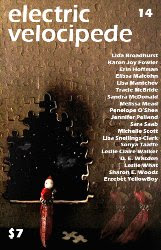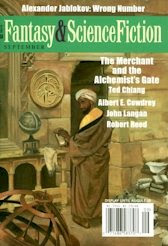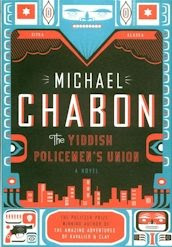
My story recommendation for this week is "
#1" by Leslie What, a short story published in the Spring 2008 issue of
Electric Velocipede (Issue #14).
"
#1" is the character study of Mindy Simmons, a vain and self-absorbed woman. She has been asked to donate a kidney to save the daughter of a half-sister she barely knows. At first blush, she seems to resist this for contemptible reasons, including that the scar might interfere with her acting career. But her real reasons have more to do with resentment toward a mother who abandoned her in favor of her half-sister, reasons that come across as uncomfortably understandable and human. "
#1" is a finely crafted, intriguing story by an author who has yet to receive the kind of attention her work merits, notwithstanding her 2000 Nebula Award for "
The Cost of Doing Business." I haven't yet read Leslie What's new story collection,
Crazy Love, but I am confident it's worth reading.
Electric Velocipede is a small but well-received fiction magazine edited by John Klima. The magazine just missed out on a Best Fanzine Hugo nomination this year and Klima is currently up for a World Fantasy Award. Incidentally, all of the fiction and poetry in Issue #14 is by women authors, so anyone who complains about underrepresentation of women in genre magazines ought to check it out.
When reading a magazine like
Electric Velocipede, one can't help wondering why some of its stories did not appear in more high-profile publications. In some cases, the answer is simply that they weren't quite good enough; the stories in
Electric Velocipede are not as consistently strong as those in
Asimov's or
F&SF. But the best stories in
Electric Velocipede compare favorably with anything in the field. I suspect sometimes those stories lack specific elements the major magazines require to maintain their brands.
In the case of "
#1," there is probably not enough of a science fictional or fantastic element for the major genre magazines. "
#1" is set in the near future, but the only piece of future technology we see is a snazzy pair of shoes that can be switched to "PowerWalk" and allow you to zoom off like Usain Bolt. The story overall doesn't have much of an SFnal feel, and could have been rewritten as a mainstream story quite easily.
But then, why should it have to be? When Mindy turns her PowerWalking shoes on, she sees the rest of the world in a blur, while her own body is the only thing that appears solid. This is a terrific metaphor for her self-centered outlook. Converting the story to straight mainstream would have lost this effective image. On the other hand, the story has no need for the extra gadgetry that might have made it feel more science fictional. Thanks to magazines like
Electric Velocipede, a wonderful story like this can appear just as the author intended.
 The Magazine of the Week is the September 2007 issue of The Magazine of Fantasy & Science Fiction (cover art by Bryn Barnard), in recognition of the cover story "The Merchant and the Alchemist's Gate" by Ted Chiang, which won the Hugo Award for Best Novelette of 2007, presented earlier this month at a much better behaved Denver convention than the one going on right now.
The Magazine of the Week is the September 2007 issue of The Magazine of Fantasy & Science Fiction (cover art by Bryn Barnard), in recognition of the cover story "The Merchant and the Alchemist's Gate" by Ted Chiang, which won the Hugo Award for Best Novelette of 2007, presented earlier this month at a much better behaved Denver convention than the one going on right now.




